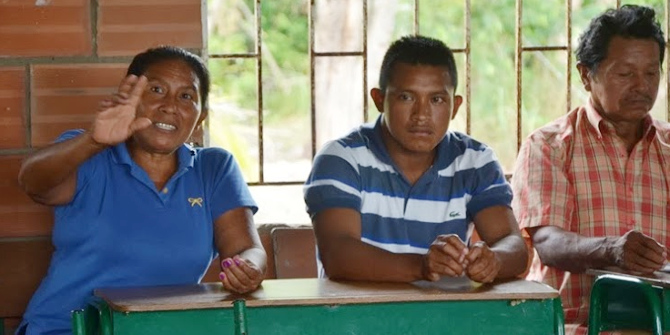 The PDET process will allow social conflicts to be addressed through democratic discussion and respect for differences, thus helping to create a broad and effective institutional framework with significant potential for transformation, writes Mariana Escobar Arango (Territorial Renewal Agency, Colombia).
The PDET process will allow social conflicts to be addressed through democratic discussion and respect for differences, thus helping to create a broad and effective institutional framework with significant potential for transformation, writes Mariana Escobar Arango (Territorial Renewal Agency, Colombia).
• Disponible también en español
The peace agreement signed on 24 November 2016 by the Colombian government and the FARC-EP guerrilla movement aims to building a lasting and stable peace by adopting the concept of ‘territorial peace’. This wide-ranging vision of development and reconciliation recognises the unequal distribution of violence throughout the territory and its differential effects on the different actors who inhabit it. For every kind of actor, the implementation of this concept presents significant challenges and opportunities.
‘Territorial peace’ implies a recognition that peace goes well beyond the silencing of guns and the demobilisation of combatants. Territorial peace entails the creation of a sense of citizenship and a new way of building and implementing territorial development as the building blocks of reconciliation and a lasting, stable peace.

Its central theme is the creation of opportunities to address the different conditions that have allowed political violence to flourish, as well as the lack of opportunities, extreme poverty, and the weakness of local institutions. It aims to guarantee the fundamental political, economic, social, environmental, and cultural rights of the people of Colombia throughout the country, and to bridge the gap between the countryside and the cities. Territorial peace applies to the whole of Colombia, but its particular focus is on the rural areas of the country, which have been particularly affected by exclusion, violence, and inequality.
The peace agreement also recognises a problem which is endemic to political and institutional development in Colombia: the excessive centralisation of decision-making at the head of national executive bodies and the historical exclusion of broad swathes of society – especially of community actors – from definitions of regional development.
From this perspective, territorial peace aims to avoid the two standard but problematic alternatives. On one hand, there is the argument that development must be planned and implemented from the centre of the country by technocrats far removed from the realities of the territories. The opposite approach holds that communities should have total autonomy in deciding their fate, thus opening the door to fragmented visions of society whose effect is to segregate the different actors within it.
Territorial peace requires therefore that actors within the community, along with other key local figures such as mayors, governors, businessmen, universities, and churches, play a central role in the transformation of their territories by being actively involved in the formulation of development policies. For communities to take control of their own development requires not only the establishment of participatory mechanisms through which communities can advance their own visions, but also guarantees that participation will translate into effective provision of goods and services that promote social and economic development.
This equation, however, would not be complete without an emphasis on strengthening territorial institutions, whether public, private, social or community-based. One of the purposes of territorial peace is to give actors control over governance of the territory and its resources.
In this context, there are two types of relationship which need to be transformed, beginning with the relationship between the central level and the regions. There needs to be a shift from a vertical relationship originating in the centre, which imposes development from the top down, towards a centre-territory dialogue that reconciles a bottom-up approach with the fragmented perspectives of community autonomies.
It is equally important, however, to transform relations between different actors at the territorial level. Here, there are a wide range of differing interests and visions which have often contradicted each other, with many related clashes exacerbating social tensions and armed violence. Examples of this include social and productive organisation of the territory and access to land and resources.
It is from this perspective that the final agreement makes Territorially Focused Development Programmes (PDETs in Spanish) the key tool for planning and managing a broad rural development process that aims to transform the 170 municipalities (covering 16 subregions) most affected by the armed conflict. As such, the PDETs will have most impact in municipalities with high rates of forced displacement and land dispossession, killings, massacres, and forced disappearances, above average rates of extreme poverty and inequality, the strongest presence of illicit crops, and the lowest levels of institutional performance at local level.

The PDETs will be the means of building of territorial peace in these 170 municipalities as a joint project between the territories and the state. They are drawn up by participatory means, with recognition of the organisational processes which exist in the regions, all relevant local actors expected to take part, and community actors playing a central role.
The PDETs will be implemented through action plans created at village, municipal, and subregional level. They will be structured around the social organisation of rural property and land use; economic renewal and agricultural, environmental, and forestry production; roads and productive infrastructure; land suitability; health and education; rural housing, drinking water and basic sanitation; a progressive guarantee of the right to food; and reconciliation, coexistence and peacebuilding. Differential approaches to gender and ethnic specificities will also be integrated with programmes designed to boost governance capabilities in these regions.
This process began in August 2017, and by April 2018 sixteen PDETs and their respective action plans are expected to be in place. The challenge facing the Territorial Renewal Agency (ART), which is responsible for implementing the PDETs, is to ensure the full and effective participation of all territorial actors in the creation of the PDETs: 16 regions, 170 municipalities, 10,000 villages, 425 indigenous reservations, 3,015 community councils from Afro-Colombian communities, and 6 farming land-reserve zones, giving 250,000 Colombians in the areas most affected by the war an active role in shaping the future of local development. Once the sixteen PDETs and action plans have been drawn up, it will be the task of the ART to coordinate implementation of the programmes and plans over the next 10 years, which is the timeframe established in the peace agreement.
he drawing up and implementation of the PDETs and their action plans will be the result of participation, discussion, and agreement between social organisations, producers’ associations, socially reintegrated members of FARC, victims of the armed conflict, coca farmers, community action councils, ethnic communities, businessmen, academics, churches, mayors, governors, and other key players in the territories. In this regard, the PDETs can be understood as social agreements through which the foundations of reconciliation and a sustainable peace can be strengthened, thereby going beyond the purposes of territorial development.
The PDET process will enable social conflicts which were previously resolved through the use of weapons and violence to be dealt with through democratic discussion and respect for difference. If properly implemented, this broader institutional framework will have far more potential for transformation. What is at stake is not only access to land, productive assets, and public goods and services for the most vulnerable members of society, but also the very redefinition of what “public” and “collective” mean.
Reconciliation, which is an essential factor for peace, should thus be understood in a broader sense, as the ability of different people to recognise each other as being integral, deliberative parts of a common, shared endeavour.
Notes:
• The views expressed here are of the authors rather than the Centre or the LSE
• Please read our Comments Policy before commenting






Such a beautiful country and people – hope they can get the peace to last!
Cary Michael Cox